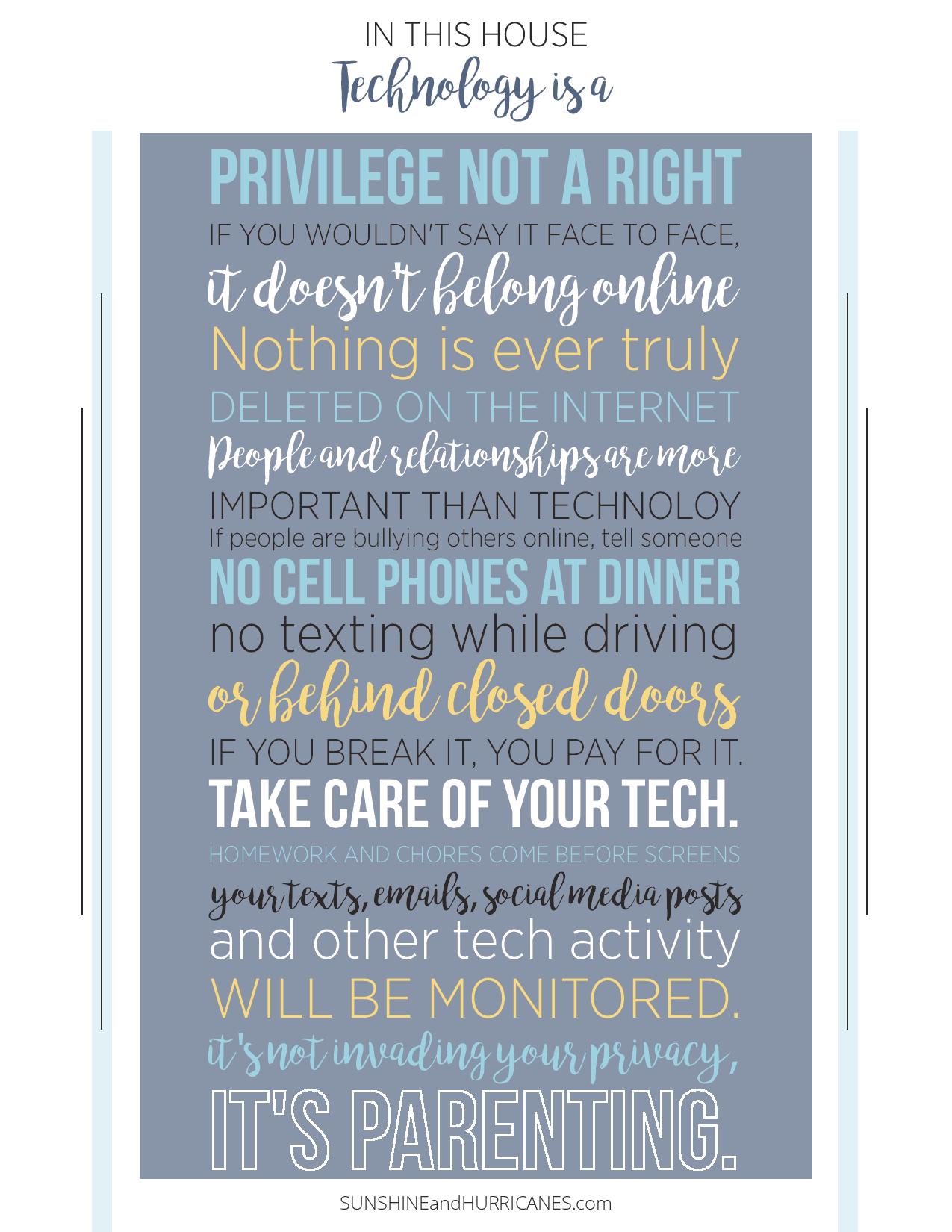Inside:Tech Rules for Teens and Tweens (printable)
Parenting is Hard.
And then there is parenting tweens and teens, which is like The Real World meets Survivor. Truly, it’s like some kind of reality show, and we just keep looking for the cameras, because seriously some days…..
BUT on top of all that, in today’s world, it sure as heck feels like in all our non-existent spare time we need to be getting our Ph.D. in Techno Ninja skills. If Bill Gates and Mark Zuckerberg could just get together and create some kind of manual for all of us, that would be freakin’ fantastic!
Until that happens (yeah, I’m not holding my breath), we need some solutions to help us out right now.
First, there is the worry that keeps us up and night about what our teens might be seeing online, or doing or WHO they might be meeting. And then there are just the daily battles of trying to get them to turn off the devices and plug into life.
There isn’t one easy answer when parents are tearing their hair out over tech, but there are tools we can use to make easier. One of the biggest is to set some ground rules.
When our expectations are clear, at least on some basic principles, than our teens understand where we stand. It also gives a starting place for conversations on some pretty tough topics that we really need to be talking about with our teens.
Tech Rules for Teens and Tweens

Technology is NOT a Right
Our teens and tweens today sometimes have a hard time understanding the difference between what is a right and what is a privilege.
They have a right to shelter, food, an education, clothing and our love.
By food, we don’t mean that we’ll fund their daily before school Frappuccino habit. And by clothing, that doesn’t mean brand new $300 kicks every six months.
When it comes to tech, it’s true, our tweens and teens often do need some kind of access for their education. In some cases, as young as elementary school, our children are actually being provided with laptop computers and tablets to take home for their personal use.
And by high school, giving them some kind of mobile phone is almost inevitable. These technologies have become fundamental parts of our society and they need to learn how to use them responsibly and safely. That has become part of our job as parents.
But that doesn’t translate into a right to brand new expensive mobile phones with all the bells and whistles along with unrestricted access and unlimited amounts of time to spend on all these tech toys.
Technology is a privilege, one that they earn. And in some cases, one they pay for themselves. They need to show us in other areas of their lives that they have the maturity to handle some of the temptations and risks that come with technology.
Digital Citzenship
It’s amazing how the rules for interacting with other people online can be so different than in real life.
How many of us have seen someone post something on Facebook and thought, “Wow, this person would never say something like this to my face.”
The anonymity that the internet provides, emboldens some people to act before they think. When they don’t have to actually see the face of the person who is the target of their words and process the way it hurts or demeans them, it is so much easier to say hurtful and hateful things.
Teaching our children that they shouldn’t act any differently online than they would in the real world is an essential part of parenting this generation.
There Is No Such Thing As Delete On The Internet
Tell your children to imagine that they are 18 years old. They’ve just applied to the college of their dreams. They’ve got the grades, the amazing essay, top test scores. Getting in is now nothing more than a formality.
Then your child’s application comes across their admissions officer’s desk, the first thing they do is type their name into Google. What pops up?
Maybe nothing. But as more and more teenagers are finding out today, they’re leaving a photographic history of themselves online that doesn’t represent the best of who they are.
Sometimes it’s a stupid selfie they snapped at a party when they were a little drunk of them and some friends clinking together their beer bottles in an underage toast. They stuck it on Snapchat and an idiot friend grabbed as screen shot and posted it on Instagram. Ooops.
Or maybe they didn’t even know someone snapped a photo of them making a lewd gesture at a school pep rally and posted it on FB.
So many of these incidents are momentary youthful indiscretions that wouldn’t have mattered even a decade ago.
But that was then and this is now. Our tweens and teens must know that their cyber-identities are made up of every single thing they write and post online, as well as every single photo other people take of them and post online. Hitting the delete key is often not enough to wipe these mistakes clean and they can have serious consequences for their future.
Relationships Matter
Looking someone in the eye, used to be something most people did naturally as part of interactions with other people. Now, not so much.
How often do we see kids hanging out and instead of talking to each other, their all sitting around staring down at their phones.
Does your child regularly get out of the car when you drop them off somewhere and sort of grunt a goodbye as they continue texting or watching a silly cat video.
Maybe you have a tween or teen who would rather spend hours playing a virtual game then spend time with his family playing a board game or just hanging out.
It can become so easy to allow technology to get in the way of having real conversations and making real connections.
Our teens and tweens must learn to set limits for themselves for healthy technology use and when and where it’s time to put away the phone and actually pay attention to the people around them.

Speak Up
We’re hearing too many tragic stories of tweens and teens taking their own lives because they’ve been harassed by their peers with technology being the main instrument of torment. In many of these cases, others who were not involved were aware of what was happening and yet stayed silent.
Nobody wants to be a snitch or a tattle tale, but with online bullying as prevalent as it is today, there are times when our kids need to be willing to go to a trusted adult and tell them what is going on.
When we talk to our kids about cyber bullying, it often is out of our concern that they will be a victim. What we don’t always think about is coaching them on how to handle it if they know someone else is being bullied.
They need to know that speaking up takes courage and it is the right thing to do. As Dumbledore says in the Harry Potter books, “It takes a great deal of bravery to stand up to our enemies, but just as much to stand up to our friends.”
We also need to reassure our children that if they speak up, they won’t be punished or suffer retribution.
Related: Cyberbullying; What Parents Need to Know
A NO ZONE For Cell Phones
There are some places that a cell phone just doesn’t have any place. One of those is most definitely at the dinner table. Considering how busy our schedules are, most families rarely get to sit down and have a meal together anymore. On the rare occasions it does happen, technology shouldn’t be allowed to interfere.
Families that have uninterrupted dinners together have kids that generally do better in school, are less likely to be tempted to try drugs and overall benefit from better mental health. One of the main reasons for all of these positive outcomes is what happens at the dinner table. Parents get a chance to actually talk with their kids. They find out what is happening in their lives. They also get to observe their children and may be able to spot early signs of behavior changes or other indicators that things just aren’t quite right.
All of this stops happening when cell phones enter into the mix.
No No At Night
Another place that cell phones just don’t need to be is in rooms behind closes doors. In general, this is a good rule 24/7 , because having tech in non-communal spaces opens up even good kids to unnecessary temptations and trouble. At the very least though, this should be enforced at night.
More and more studies show that when technology is allowed in kids bedrooms it interferes with them getting adequate sleep. Some will stay up too late doing homework, others are secretly texting friends until all hours. Even the blue light that many of these devices emit messes with the body’s natural circadian rhythms and can keep kids from getting quality rest.
Consider having a designated overnight charging parking lot where everyone in the family puts their phones before bed. It’s not just good for the tweens and teens, moms and dads can benefit from better shut eye as well. Plus, what a great way to role model good choices.
You Break It You Pay For It
There are many life lessons that come with the privilege of technology, and they aren’t all about how to use it correctly. Computers, tablets, and iPhones are not cheap and keeping track of and tacking care of them properly is important.
Make sure your tweens and teens are aware of exactly how much is invested in their devices. Establish a policy from the beginning about their responsibility when it comes to repairs or replacement. Should they be lost, broken or have a Starbucks Latte spilled on them what is it going to cost them?
It also doesn’t hurt for them to have a little skin in the game up front. Perhaps a condition of them getting any of these devices in the first place is that they have to pay for part of it. Or maybe they will have to contribute towards the monthly bill. At the very least, encourage them to be proactive and purchase a sturdy case. These days they can get an Otter Box for under $25.
Oh, and don’t forget to talk to them about Data and how much they’ll be into you for if they go over. 😉
Put First Things First
A great book for all teenagers to read is the 7 Habits of Highly Effective Teens (or the original 7 Habits of Highly Effective People is good too) .
The most valuable habit of all, IMHO, is #3 “Put First Things First”. So many adults struggle with this and that’s why the sooner we can help our tweens and teens put it into practice, the better off they will be. Consider it an early graduation gift.
Texting friends, playing the latest gaming app, checking social media, these are all activities that come behind. homework and chores. Well behind.
It’s not a bad idea to set designated “off” times for phones with your tweens. This way they have some time set aside already. As your kids get older, more freedom may be in order so they begin learning to manage their own schedule.
Either way, make sure there are proper consequences in place if grades are suffering or the trash isn’t getting taken out.

Technology Use Will Be Monitored
Yes, most of us trust our tweens and teens, but they are still kids. And even good kids can make bad choices. In fact, tweens and teens are kind of wired to do dumb stuff, because their brains aren’t fully formed yet.
Related: Why I Don’t Always Trust My Good Kid To Make Good Decisions
So, instead of equating trust with blind faith and total freedom, why not trust them within the boundaries of their life experience and brain development.
Technology is incredibly powerful and gives access to so many things our kids have never seen or dealt with before in their lives. Many of us as adults have a hard time with it all.
Think about the way social media can make us feel sometimes.
It’s so easy to fall into the comparison trap and start feeling bad about ourselves. Or how often do you want to just tell someone off who is posting stuff you don’t agree with, but you stop yourself at the last minute and delete it.
Now think about our teenagers in the same position. Everything is magnified 10x in the teenage mind. And self control…. yeah, that’s not exactly a teenager’s strong suit either.
Oh, and there’s a whole embarrassment factor going on here as well. Sexting, porn, naked selfies – these aren’t topics our teens are dying to talk with us about. If they can avoid the discussions they will, but that doesn’t mean they aren’t seeing this stuff.
Parenting is just as important in the virtual world as it is in the real world. Our teens and tweens need our supervision and our guidance. We have to help them gain the skills and the discernment that are required to navigate online safely and responsibly.
This is why monitoring their internet and cell phone activity is the right thing to do. Be up front about it, let them know you will be watching and checking and reading. If you’re not being secretive about it, then it’s not spying, it’s parenting.
Related: Circle with Disney; Simple Parental Controls That Make Sense
No Texting While Driving
This one is a no brainer.
The statistics are frightening. 8 deaths and 1,161 injuries a day in the US, on average, are caused by distracted driving.
The best place for your child’s phone when they are driving is in the glove compartment. There are also auto-responders on most phones that can be set to remove the temptation of answering texts while driving. Some teens have created their own system, where they buddy check each other and a passenger just takes the driver’s phone.
Before handing over the keys to any vehicle you should have all new teen drivers sign a no texting while driving contract.
And finally, actions speak louder than words, make sure you are setting an example for safe cell phone use while in the car.
You can download a copy of these Tech Rules for Teens and Tweens to hang on your fridge or a family bulletin board. This will serve as a good reminder for your kids and make it easy to review the rules when necessary.
Sign-up for our weekly newsletter full of tips and advice to help make parenting a little easier and get your FREE Teen Tech Rules Printable right away!

Related Posts:
Family Technology Rules for Younger Kids; Take Control of Tech Before Tech Takes Over Your Family
Cell Phone Rules For Tweens and Teens
The Trendiest Cell Phone Accessories for Teens and Tweens











Karen says
What a great article! I just published an article on the same subject a few days ago, and today I’m clicking around for more good ideas. You guys are spot on! Love the tech rules printable!